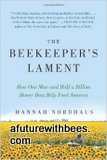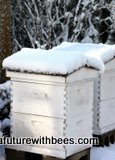![]()
![]()
As most of you know, I started keeping bees when I lived in Indiana. In 2008 I moved some of my bees with me to Missouri. Beekeeping here is different than Indiana even though we are not that far apart geographically. My beekeeping journals show just how different the Februaries are here in Southwest Missouri than they are in Indiana. These articles are here to share the lessons I’ve learned while keeping bees here in Missouri.
As we look into February, what do we expect to experience here in the Ozarks? My journals from the last 5 years show the answer could be anything from below zero temperatures to 75 degree days. February is a mixed bag. The up and down of the weather has always presented challenges for me. When it is warm, I want to believe that the warm weather will last and start looking in the beehives. I have to resist this impulse. There is very little I could do at this time of year that won’t hurt the bees more than it would help. I have learned to curb my enthusiasm until later. For now, all I do is press my ear to the sides and listen for their hum. On a warm day, I may crack the lid quickly to check with the sugar block or pollen patty are still there. If not, I may quickly add one. I never open a hive unless the bees are flying that day.
Cold will not kill the bees. The recent spate of zero degree weather prompted several phone calls from folks who are worried the “cold will kill my bees”. Relax. Cold will not kill the bees. They do fine in Minnesota and Canada with much colder temperatures than here. I know this is hard to believe. If you need further reassurance, check the bee forums and see how many experienced beekeepers are telling newbies the same thing. Bees handle cold well if they have enough honey and pollen and went into the winter set up well. If not, there is precious little that can be done to help now – it is just too late. Although cold will not kill them, moisture in the hive will. In my first year, I sealed the hives up tight and stacked hay bales around them to insulate them to make sure the cold wind wouldn’t hurt my bees. It worked too well. By spring all I had was a mass of decaying, fungus encrusted bee bodies. I’ve learned to provide an upper entrance hole to allow the moisture laden air to vent out. My hives do well now. The ones that die out are the poorer genetics. I thank our great Mother for weeding these poor performers out of my operation.
Although there is nothing we can do for the next month or so, by the end of February, the bees will start rearing more brood and their needs will increase then. I will write more about that in the next newsletter. For now, let them take care of themselves. I am spending my time making goals for this year, planning out just how to achieve those goals, and building equipment to fulfill those goals.
The winter is also when I learn lessons about record keeping. I go back over my records for the year to determine who performed the best, who produced the best, which hives contributed the most frames of brood/honey to splits, which hives have been in continual production for the longest (my record is 12 years so far), etc. etc. As I try to compare records from one hive/yard to another, I realize where I have made mistakes. The inconsistencies really show up. I've learned to keep consistent records and record the same information every time I go to a yard. Records really are invaluable.
Another surprising thing the records have shown me over the years; is how much bias works against me. I think I know which hives are best from watching them all summer. However, when the numbers are compiled and calculated, it becomes clear that many hives are actually better performers than what my gut is telling me. Keeping good records has allowed me to make much better management and breeding decisions over the years. Some my best lines would have been overlooked without good records and careful consideration.
I am also reading books and magazines, trolling the bee forums, and watching videos.  Two books I’ve read recently are: The Beekeeper’s Lament by Hannah Nordhaus, and Fruitless Fall by Rowan Jacobsen. Both are well written and, surprisingly both are written by non-beekeepers. Hannah’s book gives a very real picture of life in the commercial beekeeping world – very scary at some points. While the book is well worth the read, I cringed at how often her bee biology facts were wrong or exaggerated beyond the truth.
Two books I’ve read recently are: The Beekeeper’s Lament by Hannah Nordhaus, and Fruitless Fall by Rowan Jacobsen. Both are well written and, surprisingly both are written by non-beekeepers. Hannah’s book gives a very real picture of life in the commercial beekeeping world – very scary at some points. While the book is well worth the read, I cringed at how often her bee biology facts were wrong or exaggerated beyond the truth.
Rowan’s book is also scary. It lays out in great detail, and in a very logical manner, how desperate the state of our bee-keeping environment is becoming. Despite being a non-beekeeper, his facts are 99% correct and extremely well re-searched. Despite the title (which almost caused me to put it back on the shelf thinking it was another “beekeepers are evil and doom is upon us” book), it is a VERY thought provoking book. I hope everyone of us reads it.
Rowan refers to Kirk Webster and his protégé Mike Palmer. Kirk is one of the foremost advocates of self-sustaining apiaries and breeding better, local genetics. This is something I have been working towards for years. I would like to hold a series of field days this year to demonstrate some of these concepts that I have been using here in the Ozarks. I have grown my apiaries without needing to purchase any queens or packages or nucs for years. And, I’ve done it without chemicals. Enjoy your winter - Spring and hard work are coming fast!
I hope that sharing my mistakes and experiences will help you understand why choices are necessary and will help the bees!
Kirk’s website is: Kirkwebster.com Check it out. Mike Palmer has several talks recorded on Youtube or Vimeo. Look him up. Start with this one:
